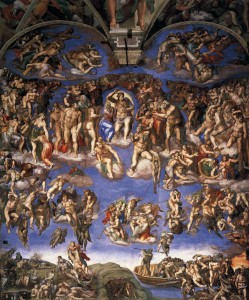How will you be judged?
The word ‘Parousia’ is a transliteration of the Greek παρουσία and in classical Greek it means or implies a presence or an arrival. Saint Paul often used it to indicate his own presence or impending arrival somewhere, such as Corinth or Philippi. In the early church, Christians believed that the end time, coupled with God’s final judgment, was imminent, and that they would know it by the second coming of the Son of Man, Jesus Christ. Early Christians called this event the Parousia or the day of the Lord.

Last Judgment – Michaelangelo
More than two-thousand years have passed and Christians, throughout the world, continue to believe in and await the Parousia event, although with perhaps a slightly longer outlook as to when. But no one knows when God will have had enough; no one can predict when Parousia will occur.
Very few today will profess or proclaim that the end time is near, although many will admit that these times are assuredly not heavenly; and most would agree that our times are in desperate need of salvation, but then, that has been essentially true since God created man and all things.
Choose any period of time throughout human history and you will find a plethora of examples of man’s inhumanity, at times more predominant than at other times, but never completely absent. Even God’s only attempt to purge humanity of its inhumanity by destroying all of mankind except for Noah and his family failed to eradicate our concupiscence.
What we can also surmise and assume is that the preponderance of the human race will not be physically present when Parousia finally arrives, for most of us, along with all of our ancestors, will have long left this mortal life for a spiritual and eternal one. But whether mortal or immortal, all will await Parousia and the final judgment of God. How we will be judged will be predicated entirely on how we have lived our lives while on this earth.
At the final judgment, “when the Son of Man comes in his glory” [Mt 26:31] Jesus tells us that we will be separated by how we treated others. That should be worth at least a moment’s consideration. We will be judged not by how much wealth we have accumulated, nor by the fame we have acquired, nor by the power we have attained, nor by how well we have behaved, but rather, we will be judged solely by how we have treated our fellow man: family, friends, enemies, neighbors, and strangers.
Jesus said “Amen, I say to you, whatever you did for one of these least brothers of mine, you did for me.” [Mt 26:40] And anticipating our tendency toward nuanced pettifoggery, Jesus restates this so as to leave us absolutely no wiggling room by saying, “Amen, I say to you, what you did not do for one of these least ones, you did not do for me.” [Mt 26:45]
Seeking reward in this life is self-defeating, just as the rich man discovered when he died, for he had been rewarded and would now be forever tormented [Lk 16:19-31]. We should constantly remind ourselves that whatever we do and do not do for others is for our own benefit, for our own salvation, yet ultimately, it is all for God.
